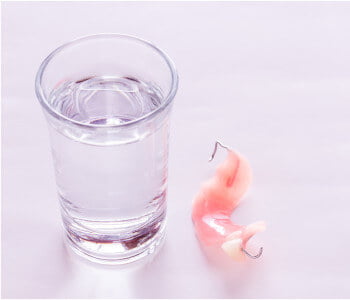Dentures provide an attractive, supportive, and practical tooth replacement. However, if you want them to last a long time, you must look after them. Aside from keeping them clean and hygienic, most denture types will lose their shape if they are not kept moist. Therefore, when you take your dentures out at night, you should store them in liquid. But what kind of liquid should you be soaking them in (and which ones should you avoid)? We take a look…
The best ways to keep dentures clean
Studies recommend key factors when cleaning dentures to ensure that they remain clean, and safe to use. An essential factor is the removal of all plaque and stains from denture teeth. Furthermore, there should not be any damage caused to the dentures when cleaned, as this can lead to future problems. Finally, the cleaning process must be antimicrobial. Three principle ways that these factors can be implemented have been detailed below:
Soaking and overnight care
It is essential to remove your dentures from your mouth before sleeping, as is will help give your gums relief from the pressure. It will also help avoid warping or potential infections such as pneumonia and denture stomatitis taking place. Soaking the dentures is also essential, as it can ensure they are cleaned deeply as well as stored safely overnight. Using a denture cleanser can help destroy bacteria and keep them clean.
You should ensure that you follow the manufacturer’s instructions when using a cleanser, to ensure no damage is done to the dentures. If the cleanser you are using does happen to contain sodium hypochlorite or bleach, then it should not be soaked for more than ten minutes. Ideally for overnight soaking you should only be using water, as cleanser solutions can potentially damage dentures if used for prolonged periods of time.
Regular dental visits
Ensuring that your regular dental visits booked in is essential to ensure you dentures and your oral health is looked after. This will allow the dentist to check the dentures are fitted correctly to your mouth and will allow any potential issues or changes to be evaluated. It will also allow you to have the dentures cleaned more thoroughly then is possible at home, using tools such as ultrasonic cleaners. These tools can ensure that any biofilm which has formed on your dentures over time is eradicated, ensuring they remain clean and safe to use.
Accurate brushing
When brushing your dentures, it must be done with a decent toothbrush, as well as cleaner which suits your particular set of dentures. Using any toothpaste to clean the dentures can potentially be problematic and damage them over time. Your dentist should inform you of the proper tools required for brushing your dentures, and you should use these products at all times. Some key tips on how to brush your dentures properly have been outlined below.
- Look at the manufacturer instructions for the denture cleaner you are using, and ensure you rinse the dentures before using them again if required.
- Brush your dentures twice a day and use cleanser a minimum of once a day.
- Try and clean dentures over a towel/pool of water, this will ensure that they do not break if they fall out of your hand.
- Remove the dentures from your mouth before cleaning them, as this allows you to clean them more comprehensively and avoids any substances accidentally entering your mouth.
- Try to rinse your dentures whenever you consume food.
Cleaning substances to avoid
Some key substances to avoid using to soak your dentures have been detailed below. These substances do not meet the aforementioned key factors needed to clean dentures.
- Mouthwash or Isopropyl Alcohol: While these substances can help remove microbes from dentures, they have the potential to damage the dentures
- Bleach: It is essential to avoid using bleach on dentures, unless directly advised so by your dentist. This is because studies have shown that bleach does damage the acrylic in dentures, and if you seek whitening then it should be done professionally.
- Soaps, salt or vinegar: All of these substances are largely ineffective in destroying the microorganisms that are within plaque
- Homemade denture cleaners: Most homemade methods for creating denture cleaners that you may read about are mostly ineffective for your dentures. This is because items such as hand soap or dishwashing liquid will not work with dentures and may cause damage in the long run.
- Peroxide: While using specifically made for denture cleaning products that contain peroxide is not an issue, if you are using household peroxide then you may be causing more damage than good.
The importance of denture cleaning
It is vital to keep dentures clean, as an unclean pair of dentures within your mouth can have serious negative consequences for your health. Some of the key health issues that can be caused are:
- Dentures can become warped or stained, meaning they are uncomfortable in the mouth and require costly replacement.
- Inflammation in the mouth and potential sores due to denture stomatitis.
- In some serious cases it can lead to pneumonia.
- May leave a bad taste in your mouth and halitosis (bad breath).
- Can mean your taste is altered
Hear what our patients think of our denture work and when you’re ready, contact us to arrange an appointment.















